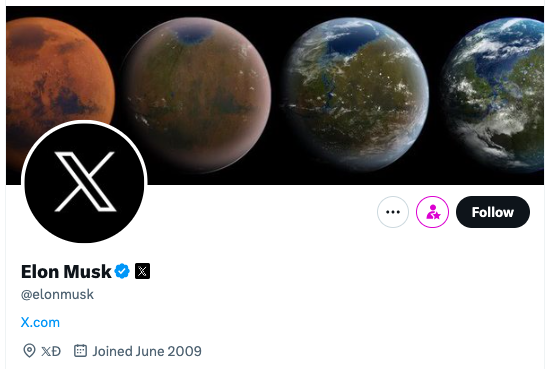Building businesses whose activities once seemed ahead of their time, the billionaire Elon Musk has taken many risks over his career. He founded Tesla, Neuralink, and SpaceX—popularizing electric cars, developing brain-machine interfaces, and building rockets to send humans to Mars.
His latest big risk is rebranding Twitter, the social-media site he bought in 2022, as simply “X” – removing its iconic bird logo. The move aligns the brand with some of his other companies as well as with his son’s name. Critics have called it “brand suicide”.
What is it about Elon Musk’s brain that has made him so confident taking what to many others might seem to be daunting risks?
One possible explanation could be his neuro-divergence. Appearing on Saturday Night Live in 2021, Musk revealed that he has Asperger’s syndrome, a form of autism spectrum disorder. Might his ASD diagnosis shed light on his risk perceptions, attitudes, and choices?
The answer is complicated. It reveals apparent contradictions among current ASD research and the limits of work that has been done so far. Nevertheless, it contains insights to which investors, employers, and other corporate stakeholders should pay attention –both for the potential pitfalls and for the benefits that ASD may offer for catalyzing innovation.
An Erasmus University Rotterdam study by researcher Kristel de Groot suggests that autistic people may be more likely to engage in risky ethical behaviors than those who are neurotypical. Autistic people, the research suggests, rely more on reasoning and analysis than emotions when making decisions. They may have difficulty viewing situations from others’ perspectives and, as a result, are more likely to have poorer cognitive empathy than neurotypical people. Hence, they tend to make utilitarian decisions in personal moral dilemmas. Some of the ethical risks that Musk has taken seems to fit this thesis.
For example, Musk’s neurotechnology company, Neuralink, was recently criticized by a major medical ethics organization, the Physicians Committee for Responsible Medicine, for violating animal testing practices and killing 1,500 animals. The committee requested the Food and Drug Administration to disqualify test results from these experiments. In trying to develop brain implants—perhaps rational in the benefit of humans if they successfully treat brain diseases—Musk subjected animals to experiments that may be questionable from a moral standpoint.
In a similar vein, in November 2022 Musk fired Twitter’s ethical AI team, which was responsible for reducing biases in Twitter’s algorithms. Perhaps this was simply a rational decision to cut costs. Nevertheless, the widely criticized choice appears to be consistent with research suggesting that people with ASD may take more ethical risks.
Another big risk was Musk’s move in April 2023 to discontinue Twitter’s blue legacy check marks, which had been used to verify that accounts of high-profile figures belonged to the individuals or companies they claimed to be. Under the new system, blue verification check marks merely verify that the account holder paid an $8/month fee—but not that the purchaser is who they claim to be.
The change upset many organizations and celebrities, some of whom, including National Public Radio and model Gigi Hadid stopped using the platform following the change.
Why? Perhaps it ties back into ASD individuals’ struggles with showing empathy. Musk may not fully understand the social dynamics behind what makes Twitter enjoyable.
The legacy blue check marks discouraged impersonation of celebrities and spread of misinformation, both of which were key in helping users to trust the website.
Musk may not have anticipated the degree of influence public figures have over their followers, including those who may abandon the site when public figures they admire do so.
In other words, the skills that made his technology companies successful are different from the ones needed to make a business based on social interaction better.
Perhaps Musk’s behavior could be better explained by another personality trait: his narcissism, which he admitted having in a 2018 Twitter post. Research shows that narcissistic CEOs tend to take bold actions to attract attention. By removing the legacy check marks, Musk certainly did succeed—yet again—in making headlines.
However, Musk’s behavior does not seem to align with other neurodiverse findings. The same study by Groot, cited above, found that ASD individuals may take fewer social risks because they find them less rewarding and have less experience with them. Musk, though, has taken some big social risks in his personal life, reportedly fathering ten children with multiple mothers and giving them unusual names.
He has tense relationships with his children; for example, his eldest daughter Vivian dropped his last name, citing that she did not “wish to be related to [her]biological father in any way.” Musk named his son and daughter with singer Grimes X Æ A-12 and Exa Dark Sideræl Musk, respectively. (In fact, his son’s name was so unconventional that California’s state law deemed it invalid, and Musk was forced to alter it slightly to X Æ A-Xii). He also had twins via IVF with Neuralink Director of Operations Shivon Zilis despite not sharing a romantic relationship with her—which makes no sense at all to most people.
Groot theorizes that the reason previous studies have had inconsistent findings around the relationship between autism and risk-taking is that decision-making varies between different domains such as in social, ethical, financial, and recreational contexts. Hence, more research is required to clearly understand how autism correlates with risk-taking in different contexts.
In addition, not every person with ASD will conform to research findings.
Nevertheless, key Twitter stakeholders, from creditor to users, should be especially interested in what drives Musk’s risk taking. Personal risk taking by CEOs affects company success—for better or for worse.
Even companies beyond Twitter should care about how ASD affects risk taking and performance.
Autistic employees can be a great asset to their teams. ASD employees can increase productivity by brainstorming solutions from different perspectives, staying highly focused for longer periods of time, and performing repetitive work well.
In fact, as Liron Rozenkrantz, Assistant Professor at Bar Ilan University, points out in her 2021 study, the “enhanced rationality” of employees with ASD may even allow them to outperform neurotypicals in some aspects. Even though they may have poorer empathy, their lack of typical biases can be an asset in some job roles.
That explanation seems to be more closely in keeping with Musk’s success in embracing big, futuristic visions and not being afraid to pursue them.
Some of the greatest scientists in history have been autistic, including Albert Einstein and Isaac Newton. Perhaps their hyperfocus on a special interest was what allowed them to devise the revolutionary theories of relativity and gravity.
The poet Emily Dickinson, sculptor Michelangelo, and composer Wolfgang Amadeus Mozart were autistic too. Their different ways of thinking may have played a part in creating such unique art. The chess grandmaster Bobby Fischer was also autistic. His ability to recognize patterns may have helped him to evaluate the game and calculate his next best move.
Many of these individuals were, indeed, more reserved and less socially risky, in keeping with the research cited earlier. They also all took risks to achieve unconventional successes in their fields.
Autistic people may be more likely to take some risks that are not as rewarding, such as Musk with his ethical risks, but some of their other risks may come with benefits. This underlines why companies should care about the impact of ASD on their employees’ risk taking—if guided correctly, their risks could lead to breakthroughs.
- GUEST POST: What Shapes Elon Musk’s Risk Choices? - July 25, 2023


